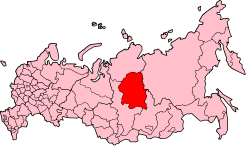Top Qs
Timeline
Chat
Perspective
Evenk Autonomous Okrug
Former federal subject of Russia From Wikipedia, the free encyclopedia
Remove ads
Evenk Autonomous Okrug (Russian: Эвенки́йский автоно́мный о́круг, Evenkiysky avtonomny okrug; Evenki: Эведы Автомоды Округ, Ēvēde Avtōmōde Okrug), or Evenkia, was a federal subject of Russia (an autonomous okrug of Krasnoyarsk Krai). It had been created in 1930. Its administrative center was the urban-type settlement of Tura. As of 2006, at 767,600 km2, it was Russia's seventh largest federal subject, and the country's least populous: 17,697 (2002 census).[1]
In 1999, the governor of Krasnoyarsk, General Alexander Lebed, demanded the okrug recognize the central district government of Krasnoyarsk had authority over it, which the okrug refused to do, causing a power struggle between the central district and the okrug's government.[2]
Following a referendum on the issue held on April 17, 2005, Evenk and Taymyr Autonomous Okrugs were merged into Krasnoyarsk Krai effective January 1, 2007. Administratively, they are now considered to be districts with special status within Krasnoyarsk Krai; municipally, they have a status of municipal districts (see Evenkiysky District).
Boris Zolotaryov was the last governor of the autonomous okrug.
Remove ads
Administrative divisions

Before 2007, Evenk AO contained three districts:
Demographics
Summarize
Perspective
Population
(2002): 17,697.
Vital statistics
- Source: Russian Federal State Statistics Service Archived 2008-04-12 at the Wayback Machine
Ethnic groups

Of the 17,697 residents (as of the 2002 census) 2 (0.01%) chose not to specify their ethnic background. Of the rest, residents identified themselves as belonging to 67 ethnic groups, including ethnic Russians (62%), Evenks (21.5%), Yakuts (5.6%), Ukrainians (3.1%), Kets (1.2%), 162 Tatars (0.9%), 152 Khakas (0.9%) and 127 Volga Germans (0.7%).
Remove ads
See also
References
Wikiwand - on
Seamless Wikipedia browsing. On steroids.
Remove ads



